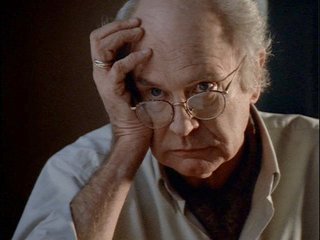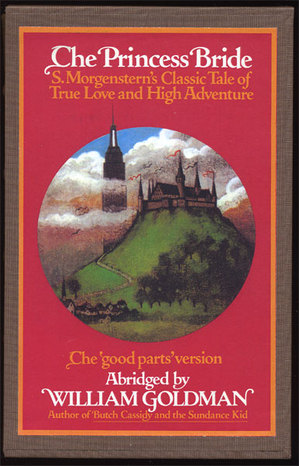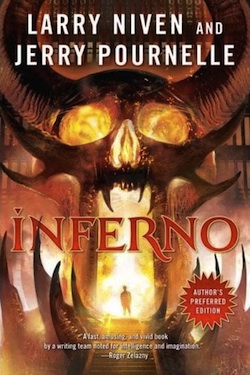The 5 Best and 5 Worst Fictional Sci-Fi/Fantasy Authors
 |
They say you should write what you know, and if there’s one thing science fiction or fantasy writers usually know, it’s being a science fiction or fantasy writer. As these genres have expanded and become more recognizable in modern culture, so too has the image of the sort of person who might spend time writing such material, and more often than not, it’s a less than exemplary one. In fact, if a character is described as a science-fiction writer you can almost certainly bet that they will be portrayed as a socially inept idiot at best. This isn’t to say that such a profession is never portrayed in a positive light, but it sure as heck doesn’t happen that often. Usually showing us a genre writer as a buffoon is an easy way to satirize the industry and the people in it. However, there are rare instances in which we get to see positive (relatively speaking) examples, authors that aren’t necessarily self-obsessed assholes, or at least not just self-obsessed. In order to give the profession a fair rap, let’s examine five from either side. Needless to say this is all speculation. Even if we could read the collected works of some of these people, it’s unlikely we’d want to.
THE BEST:
5) Chuck Shurley, Supernatural
Oh, how Supernatural enjoys poking fun at fandom and itself. The Winchester brothers may regularly encounter angels and demons’n such but one of the strangest creatures they’ve met has to be Chuck Shurley, author of a series of novels called Supernatural and seemingly dictating the events of their lives perfectly. True, this may make him an accurate chronicler within the show’s universe as opposed to a fantasy writer but how much of his audience knows that? He even writes a “very Vonnegut” (“Slaughterhouse Five Vonnegut or Cat’s Cradle Vonnegut?” replies Dean) book in which his characters finally meet him. “Obviously I’m a God,” Chuck jokes, but after the fifth season finale “Swan Song” fans were a little less sure how much he was joking. He was established as a prophet by Castiel but let’s just say things are a bit up in the air now. Probably best to put him on this side of the list to be safe. Counting against him is the fact that whether or not he’s the Creator, logically Chuck is responsible for the existence of Wincest, although if God really is a supporter of incestuous slash then the endurance of Fan Fiction Friday here at TR makes a little more sense…
4) George McFly, Back to the Future
In the original timeline, of course, Marty McFly’s dad is just a spineless working stiff with no future who enjoys laughing at the same sitcom for far too long. But back in 1955 he was a young nerd with dreams of writing stories about visitors from other planets (he was also a bit of a pervert, but maybe we can forgive him that seeing as it originally got him hit by a car). His future son manages to give him a push in the right direction not only by hooking him up with Lorraine but by scaring him straight as “Darth Vader from the Planet Vulcan” (oh the things you can do with Van Halen, a hairdryer and a radiation suit). One Enchantment Under the Sea dance and three decades later George is a bestselling author with boxes full of his hit book A Match Made in Space. It’s too bad Glover didn’t stick around for the sequels as it would have been great to see his other novels: I’m picturing a career retrospective on 60 Minutes, or maybe a documentary on the inspirational role mayor Goldie Wilson played in his work.
3) S. Morgenstern, The Princess Bride
 |
If you’re an unusually trusting Princess Bride fan who’s been searching for years for a definitive answer to this question (but not actually searched very hard), worry no more: S. Morgenstern, the alleged “author” of the book The Princess Bride, is not a real person. The nature of Morgenstern’s “original” text is explored more thoroughly in William Goldman’s novel, which presents itself as an abridgement. Goldman explains that as a child his father used to read the story to him, but did so in a way that left out the boring parts, as the “real” Princess Bride was intended as a satire of Renaissance-era European politics, and less as a fantasy adventure. Thus Goldman constantly interrupts the novel (as Fred Savage interrupts the movie) to “skip to the good parts.” Unlike Savage, though, Goldman informs the reader specifically of the drudgery he’s helping us avoid, making us grateful we don’t have to plow through pages of wedding preparations. Morgenstern in the end is held as being responsible for the good as much as the bad, though. Goldman was so committed to the gag that he actually wrote and published another Italian-flavored fairy tale novel, The Silent Gondoliers, under Morgenstern’s name. Not too bad for a guy who never existed.
2) Jose Chung, The X-Files/Millennium
It’s never specifically stated that Charles Nelson Reilly’s writer character from The X-Files specializes in science fiction, (his novel “The Lonely Buddha” is apparently some kind of thriller) but he does claim that he wants to launch a new genre of “nonfiction science fiction”, so that’s enough to get him on here. Chung, sort of a conspiracy-minded Capote, of course features in the classic season 3 episode “Jose Chung’s From Outer Space“, and though his efforts to research alien abductions form the skeleton of the episode’s plot, we actually see very little of his own work aside from the book of the title (the cover of which is a parody of Whitley Strieber’s real-life alien contact book Communion). The improbably named Chung appeared again in an episode of Millennium, “Jose Chung’s Doomsday Defense” investigating the cult of “Selfosophy”. As the hilarious intro demonstrates, Chung’s even more of a comedic figure this time around, and I’m pretty sure that’s the only episode of any speculative drama series to utilize a clip from Lidsville as “an award-winning film at Cannes.”
1) Kilgore Trout
Obviously. I’m not sure most of this list would even exist had Kurt Vonnegut not created his famous, legendarily cantankerous anti-hero and semi-surrogate. Trout is of course said to be based on Theodore Sturgeon (get it?) and, as one of the chief pieces of conceptual continuity in the Vonneverse, shows up in many novels. Trout is shown to be quite prolific and his body of work includes such classics as Maniacs in the Fourth Dimension, “Bunker Bingo Party,” and Venus on the Half Shell. This last one was actually adapted into a real novel by superfan Phillip Jose Farmer under Trout’s name. But Trout, who appears or is mentioned in many of Vonnegut’s novels, is more than a parody. He is a means of conceptual continuity and a summation of Vonnegut’s opinions of humanity, cynical and flawed but ultimately a creature of life and endurance. His work, dodgy as it may be, manages to inspire at least a couple characters to change their lives. Hell, in Galapagos Trout even came back from the dead to offer his son, Leon Trotsky Trout, passage through a magical blue tunnel into the afterlife. Oh, and if you’re wondering where that clip is from, it’s Alan Rudolph’s near-unwatchable Breakfast of Champions movie, the only mild silver lining of which is Albert Finney as Trout. Even then, the only real reason for that movie to exist is to serve as visual aid for tricky subjects on a list like this one.
The worst fictional SF and fantasy authors are on the next page.
—-
THE WORST:
5) A.F. Gordon Theodore, Party Down
All the members of the Party Down gang were losers in their own way, from wannabe heartthrob dudebro Kyle to “show mom” Lydia to failed Apatow walk-on Casey. But Roman DeBeers, Martin Starr’s embittered nerdy screenwriter who deals strictly in “hard sci-fi”, is an especially heartbreaking character to us geeky folk. Like his bowtie-wearing comrades, Roman often proves to be his own worst enemy, screwing up even the best breaks that come by way. Case in point: “Joel Munt’s Big Deal Party,” a bash thrown by Munt, Roman’s former writing partner. Munt may be successful but he definitely comes across as a bully, bragging about the sale of his sci-fi screenplay and revealing that he hired Party Down specifically to lord his success over Roman. That screenplay is an adaptation of a novel I won’t even try to spell by the lion-maned A.F. Gordon Theodore (David Gruber Allen), a goofy and pompous elder nerd who may live in a castle but doesn’t know the first thing about doing coke off of a woman’s tits. Roman manages to score an “Iago-style” victory at first when Theodore learns about Munt’s plan to use CG in the film and storms away angrily. But then he accidentally helps Joel solve the problem and win A.F. back, winding up right where he started. Ultimately, despite his creator status, even a “genius” like Theodore is helpless in the thrall of reptiles like Munt. As he puts it, Munt’s “got the drugs, and the women, and the Keep is a rather cold and lonely place.” At least Theodore has his 12-book “duodecilogy” to go back to.
4) Allen Carpentier, Inferno
 |
Carpentier (his name is really “Carpenter”) is the protagonist of Larry Niven and Jerry Pournelle’s Inferno, a retelling/parody of Dante written in the late ’70s. Carpentier’s novels include The Chill, which is apparently about a man whose brain survives being frozen, which serves as a bit of foreshadowing. At a sci-fi convention afterparty, attention-seeking Allen attempts to impress his friends by re-enacting a drinking challenge from War and Peace on a window ledge (an allusion lost on the “middle-aged adolescents” in the crowd). Unfortunately, halfway through an upside-down bottle of rum Asimov walks in the room, and the resulting inferiority complex sends poor Allen toppling over the edge and into the outer reaches of Hell. Soon he meets a guide named Benito, who, just like in the original, takes him circle by circle through damnation. It is revealed at the end (30+ YEAR OLD SPOILER WARNING) that Benito is indeed Benito Mussolini, attempting to atone for his sins. Like the other inhabitants of this list, Carpentier is (at least at first) presented as a buffoon, but there’s more than a little sadness in his character. He is persistently aware of how mediocre he is and it is fitting that his desperate attempts for fanlove bring about his demise. The idea of an author croaking at a convention may seem a little far-fetched until you remember the way Harlan Ellison (incorrectly) announced he would die last year…
3) Gabriel Knight
In many noir/mystery stories, the protagonist’s occupation is either a private detective or irrelevant, and it’s possible to forget that the titular hero of Jane Jensen’s Gabriel Knight series is a schlubby author of supernatural mysteries in addition to being a shadow-hunting “Schattenjager”. We don’t get much of a glimpse into his publication history prior to the first game, Sins of the Fathers, but we do see that he owns a bookstore in New Orleans and barely makes enough to get by. His success in solving that game’s voodoo murders leads him to write a bestseller entitled, uh, The Voodoo Murders, starring a detective counterpart called Blake Backlash with a sidekick patterned after Knight’s actual Japanese-American sidekick Grace but insultingly named “Fujitsu.” This novel sounds pretty horrible but it proves to be a success nonetheless loved by obligatorily obnoxious fat people everywhere. Plus, it seems fitting that in addition to being a sleaze and a bit of a lout, Knight would also turn out to not actually be that good of a writer. The manuscript of Gabriel’s follow-up novel is sort of a running joke in the Tim Curry-less second game, The Beast Within, as it sits in his inventory unused. However, judging by Grace’s reaction when she sees it, it doesn’t appear to be much of an improvement.
2) Ronald Chevalier, Gentlemen Broncos
I still haven’t actually seen Gentlemen Broncos, but I can already tell that the best part has to be Jemaine Clement’s warbling science fiction writer Dr. Ronald Chevalier. Described by Clement himself as “douchey” and more than a little reminiscent of a dark-haired L. Ron Hubbard, Chevalier is all surface, a pretentious hack with an earpiece who steals the manuscript of a student at one of his writing camps and passes it off as his own. Honestly, I’d rather watch a 90-minute video of Chevalier’s instructions on his craft than the film itself, if only to hear him squirt more weirdly echoey words out of that impossibly velvety throat of his (seriously, that guy gives even Don Warrington a run for his money). Apparently I’m not the only one, as an animated fan video based on Chevalier’s work has since graced the webtertubes, and it’s pretty great. One thing Chevalier and I can agree upon is that Ray Lynch’s “The Oh of Pleasure” holds within it the key to the cosmos, as long as you don’t damage your seed while listening to it.
1) Garth Marenghi
“Author, visionary, dream weaver, plus actor”: the list of things Marenghi thinks he excels at is near-endless. Matt Holness’ inspired comic creation is the ultimate cautionary tale for anyone who fancies themselves the next Stephen King, or even the next Dean Koontz. Darkplace, both the show created by Marenghi and the actual cult Channel 4 show, is positively educational for anyone who can’t quite grasp the concept of the “Mary Sue”, as the woefully untalented Garth casts himself as impossibly dashing “Dr. Rick Dagless MD.” In the trashy, low-budget world of Darkplace’s supernatural hospital, Dagless is an undisputed paragon, and he functions primarily as a way for Marenghi to and strut and act macho and even promote himself in-show. Of course, the “behind-the-scenes” interviews show us that Marenghi is an egotistical fool who has only managed to survive because of his unscrupulous publicist Dean Learner (the brilliant Richard Ayoade), who is simultaneously clueless and corrupt. The more we learn about the making of the fictional Darkplace the more we uncover about the shady deals and undercover killings that bought the show its pathetic original run in the ’80s. But it’s weirdly adorable to see how much the two showrunners try to really believe in their work (in one episode Learner calls it “the most significant televisual event since Quantum Leap“). You’d almost feel sorry for Marenghi if he wasn’t such an impenetrably smug, misogynist git. One thing about this show that is unironically fantastic is the pitch-perfect theme song and music. Unsurprisingly, the music is credited to “Stig Baasvik, based on melodies originally whistled by Garth Marenghi.” Truly, Marenghi is a renaissance man, as long as that term doesn’t require him to be actually good at the many different things he attempts.
